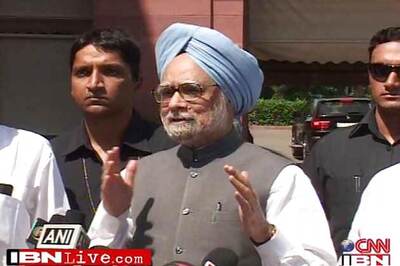
views
Srinagar: Ali Mohammad Wani keeps the roads clean in Kashmir. A resident of Nishaat in Srinagar, Wani has been working in the Mechanical Engineering Department since 1981. He is one of the many snow-clearing machine operators of the state who keep the traffic moving and thus, keep life and commerce thriving. “We have to be present 24 hours, eat and live there whether it is rain or sunny," he says.
The 55-year-old and a father of four considers his office his second home. Age has taken his front teeth; white hair and beard reflect his fatigued face because of the off-putting tasks he has been doing.
The Mechanical Engineering Department in Kashmir began clearing snow with machines in 1987. At the time, the department had the strength of just a few employees and a couple of machines. It was only in 1990 that regular staff was sanctioned for snow clearing.
Headquartered in Srinagar, the department maintains and operates road construction equipment, and is responsible for running and maintaining central heating systems and other allied mechanical works in the Hospitals of Government Medical College, Srinagar and Director Health Services, Kashmir.
Wani worked as a casual labourer in the department for two decades before he was regularised. Presently, most of the fellow operators working with him are working as casual labourers for a salary of Rs 7,000 per month.
Wani feels lucky to be a regular employee with a pension. He drives an advanced high-end snow clearer from Mercedes called Unimog.
A usual work-day for a snow-clearing operator is mostly spent waiting for snowfall. “If it snows in the morning," explains Wani, “we visit the spots at the same time. If it snows at night, we start work at 3 or 4am."
Prompt action in these snow-tight situations on the road is out of the question. Roads are filled with cars on both sides. Hence, operators must steer their machines with great care and caution to avoid collision. Operators are charged with compensation and threats “if someone’s vehicle is hit".
The team of engineers at the department devise route maps for work by the start of winter season.
“As the winter sets in, we start working on the route maps. We work on the previous maps and make necessary improvements," said Abdul Rasheed, executive engineer of the department. He and his team of engineers are the back bone of the operation.
Most of the 150 snow-clearing machines owned by the department are four-by-four trucks attached with snow ploughs. The other machine, which has remained effective in Kashmir, and works efficiently in the narrow lanes of the city is called Snowcat.
“We procure normal tractors and then our engineers work on making and fixing the snow-plough on it with other modifications," said another engineer of the department, Sajad Ahmad. The Snowcat is assembled in the garage of the department.
Wani prefers to work at night. His experience with day-time traffic on the road during clearance has been unpleasant. It is easier to clear snow at night with no traffic, he says.
However, traffic is not the only problem during Wani’s time at work. Most of the vehicles have no heating arrangements inside and the operators drive alone. The mode of communication is their mobile phone, battery of which gets swiftly drained in the freezing cold.
Sometimes operators have no line of communication, and are cut off from their families for as long as six months, recalls Wani.
Additionally, machines get damaged due to manholes under the snow that appear on the road in disproportionate sizes and elevations. “How would one know what is under the snow?" he asks. With slow, cautious driving, machine operators avoid the snow plough getting stuck in a manhole.
The impatience to work faster involves the risks of jerks and accidents. The fatality of accidents may stretch to the driver getting thrown out of the windshield. Here, good roads increase the pace of work done.
When asked about the number of deaths in the line of duty or accidents, the department refused to share data.
Although Wani’s good fate and skill has never landed him in a ‘manhole crisis’, his machine does face nominal wear and tear. The snow-plough needs an occasional maintenance run-up.
The nature of this snow-clearing job involves certain hardships: long stretches of work, patience and lots of waiting. Sometimes, Wani works up to 12 hours at a stretch. “When there is snow, there is no rest," he says.
Always on the go, machine operators keep moving from one side to another. A cleared road is filled with snow minutes after a clean-up. Snowfall is cruel to its loyal lover.
Since 1981, Wani has covered the length and breadth of Kashmir: from Gurez to Mughal Road, Tangmarg to Peer ki Gali and Poonch, clearing up snow on the road. He finds the cities easier to clear than the valleys, and VIP areas such as Gulmarg, perhaps because of the terrain and specificities of time and protocol that come along in such areas.
Nevertheless, these all-weather operators have constantly proven to be an asset to Kashmir’s connectivity within the region and the rest of the country. Some operators, Wani acknowledges, stay in office up to 24 hours when the weather is bad. “They leave only when the weather is good," he says.
(The author is a senior freelance journalist. All views expressed are personal)



















Comments
0 comment